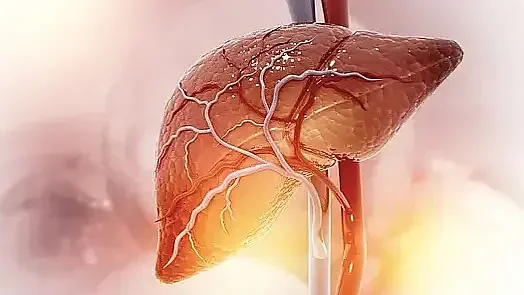Can Fiber Reduce Liver Fat Accumulation?

A Fresh Start for Liver Health
A few years back, I had a patient—a self-proclaimed “meat and potatoes guy” who’d always sworn off “rabbit food.” He came in concerned after his doctor flagged his liver enzymes. His diet was low on fiber and high on processed fare. As we worked together, his journey with fiber was enlightening, for both of us. He wasn’t just reducing liver fat; he was building a foundation for lasting health. So, can fiber reduce liver fat accumulation? Let’s dive in.
The Liver’s Role and Why Fat Accumulation is a Problem
The liver plays an extensive role in our body’s functioning, processing nutrients, filtering toxins, and even regulating blood sugar. However, in certain conditions, fat begins to store up within liver cells, creating a condition known as hepatic steatosis, or fatty liver disease. This can arise due to high-calorie diets, lack of exercise, or metabolic disorders.
But where does fiber come in? And can fiber reduce liver fat accumulation in a meaningful way? Studies show that fiber may reduce liver fat by aiding digestion, improving blood sugar, and lowering cholesterol—key factors that indirectly lessen the strain on the liver and reduce fat storage.
How Fiber Impacts Liver Health
1. Fiber’s Role in Managing Blood Sugar Levels
One essential way that fiber supports the liver is by stabilizing blood sugar levels. Soluble fiber, found in foods like oats, apples, and beans, forms a gel-like consistency in the gut, slowing the absorption of sugars and preventing spikes in blood sugar. This stabilization can lead to reduced insulin levels, and that’s significant because high insulin prompts the liver to store more fat. By maintaining steady blood sugar, fiber reduces the need for insulin, which in turn lessens fat accumulation in the liver. So, if you’re asking, “can fiber reduce liver fat accumulation?”—yes, it plays a major role here.
2. Cholesterol Control and Reduced Liver Fat
Another way fiber supports liver health is through cholesterol management. The liver uses cholesterol to produce bile, which is then used for digesting fats. When fiber is part of the diet, it binds with bile acids in the intestines, promoting the excretion of cholesterol. This means the liver has to draw more cholesterol from the blood to make more bile, which can indirectly reduce liver fat by controlling overall cholesterol levels. Less cholesterol in circulation can also lessen the amount of fat stored in the liver.
Types of Fiber and Their Benefits
Fiber isn’t just one-size-fits-all. It exists in two primary forms—soluble and insoluble. Both can impact liver health, though in slightly different ways.
Soluble Fiber: This fiber type, found in foods like oats, lentils, and fruits, dissolves in water to form a gel. It slows digestion, which helps with both blood sugar and cholesterol management—two factors directly connected to fatty liver reduction.
Insoluble Fiber: Found in whole grains and vegetables, insoluble fiber doesn’t dissolve in water but adds bulk to the stool, promoting regularity. While its impact on liver fat is less direct, regular bowel movements aid in toxin elimination, reducing the liver’s burden over time.
Can Fiber Reduce Liver Fat Accumulation Over Time?
Research suggests that a diet high in fiber may gradually reduce liver fat. A high-fiber diet helps in reducing calorie intake by promoting satiety, or a sense of fullness. This mechanism is particularly helpful for those with fatty liver due to excess calorie intake. Fiber-rich foods are often low-calorie, meaning they allow one to feel full without the high-calorie impact. Over time, the calorie deficit leads to reduced fat storage in the liver, benefiting overall liver health.
One important study found that people with high fiber intake had better liver enzyme levels and less fat stored in the liver. Another study linked fiber with improved gut microbiota, which influences inflammation and fat metabolism—factors directly impacting the liver. So, can fiber reduce liver fat accumulation? These studies suggest it certainly can, and quite effectively over time.
Fiber-Rich Foods to Incorporate for Liver Health
1. Oats and Barley: These grains are loaded with beta-glucan, a soluble fiber that has been shown to reduce cholesterol levels and support liver function. A warm bowl of oatmeal can be a great start to the day.
2. Berries and Apples: High in pectin, a form of soluble fiber, berries and apples can stabilize blood sugar and reduce cholesterol, two key benefits for liver health.
3. Beans and Legumes: With both soluble and insoluble fiber, legumes like lentils and beans help regulate digestion and support liver health. They’re an excellent plant-based protein source, too.
4. Leafy Greens and Cruciferous Vegetables: These veggies support overall digestion and promote satiety without the calorie load. Leafy greens also have antioxidants that further support liver health.
5. Nuts and Seeds: These pack a mix of fiber, healthy fats, and protein, helping reduce the liver’s fat burden and providing essential nutrients.
The Challenges of a High-Fiber Diet
Increasing fiber intake isn’t without its challenges. Many people experience initial bloating or digestive discomfort when adding more fiber. A slow increase is best, allowing the body to adjust. Staying hydrated is equally important, as water helps fiber move smoothly through the digestive system. If you’re wondering “can fiber reduce liver fat accumulation” without side effects, the answer is yes—but gradual changes and water intake are key.
How the Anti-Inflammatory Aspect of Fiber Plays a Role
Fiber doesn’t just impact liver health by regulating blood sugar and cholesterol; it also has anti-inflammatory benefits. When inflammation is present, liver cells are more susceptible to damage, leading to further fat accumulation. Fiber supports gut health, leading to a healthier microbiome that reduces inflammation markers throughout the body, including the liver. This gut-liver connection is crucial when discussing how dietary choices impact fatty liver disease.
Incorporating Fiber into a Daily Routine
If you’re trying to incorporate fiber into your life to support liver health, start with gradual, manageable changes. Swap refined grains for whole ones, add vegetables to every meal, and consider a fiber-rich snack like nuts or fresh fruit. Even these small steps can contribute significantly to liver health.
Final Thoughts: Can Fiber Reduce Liver Fat Accumulation?
In answering the question, “can fiber reduce liver fat accumulation?” we see that fiber plays a central role. From controlling blood sugar and cholesterol levels to supporting anti-inflammatory processes, fiber contributes to liver health in multifaceted ways. For those with a fatty liver, adding more fiber-rich foods could be a valuable, non-invasive way to support liver function and reduce fat accumulation.
Conclusion: A Pathway to a Healthier Liver
Fiber isn’t a quick fix, but its benefits are foundational and impactful over time. If you or someone you know is concerned about fatty liver, dietary changes involving fiber can be a gentle yet effective approach.
Share this article

Dr. Irene Paragas, MD
I am a Medical Doctor, Registered Nutritionist-Dietitian, and seasoned virtual professional. See Full Bio.
-
1. Zhao H, Yang A, Mao L, Quan Y, Cui J, Sun Y. Association between dietary fiber intake and non-alcoholic fatty liver disease in adults. Front Nutr. (2020) 7:593735.
-
2. Anderson JW, Baird P, Davis RH., Jr., Ferreri S, Knudtson M, Koraym A, et al. Health benefits of dietary fiber. Nutr Rev. (2009) 67:188–205.
-
3. Zhang S, Zhao J, Xie F, He H, Johnston LJ Dai X, et al. Dietary fiber-derived short-chain fatty acids: a potential therapeutic target to alleviate obesity-related nonalcoholic fatty liver disease. Obes Rev. (2021) 22:e13316.
-
4. Krawczyk M., Maciejewska D., Ryterska K., Czerwińka-Rogowska M., Jamioł-Milc D., Skonieczna-Żydecka K., Milkiewicz P., Raszeja-Wyszomirska J., Stachowska E. Gut Permeability Might be Improved by Dietary Fiber in Individuals with Nonalcoholic Fatty Liver Disease (NAFLD) Undergoing Weight Reduction. Nutrients. 2018;10:1793.
-
5. Carlson J.L., Erickson J.M., Lloyd B.B., Slavin J. Health Effects and Sources of Prebiotic Dietary Fiber. Curr. Dev. Nutr. 2018;2:nzy005.
-
6. Cantero I., Abete I., Monreal J.I., Martinez J.A., Zulet M.A. Fruit Fiber Consumption Specifically Improves Liver Health Status in Obese Subjects under Energy Restriction. Nutrients. 2017;9:667.
Can Malnutrition Cause Fatty Liver? One of the most perplexing cases I encountered was a young man who came into my clinic, looking quite frail...
Sweet Potato Pancakes There’s something comforting about waking up to the aroma of warm pancakes, and when they are packed with nutrients like...
How the DASH Diet Supports Liver Health In my years as a medical doctor, I’ve encountered countless patients grappling with liver health issues. One...

You might enjoy more articles by
Dr. Irene Paragas, MD
 Disease
Disease Diets
Diets Recipes
Recipes Supplements
Supplements Management
Management Calculators
Calculators Quizzes
Quizzes Glossary
Glossary
























